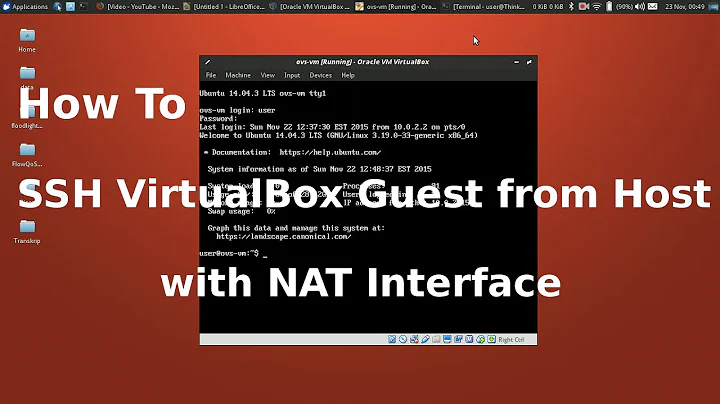How to ssh into a LXD guest?
Solution 1
By default, all Ubuntu lxd images for containers are set up with PasswordAuthentication no in their SSH configuration.
You need to go into the container directly and edit the config as root.
(1) lxc shell CONTAINER-NAME will drop you to a root shell.
(2) nano /etc/ssh/sshd_config will open the nano text editor to that file.
(3) Find the line PasswordAuthentication no and set it to yes.
(4) Ctrl+W to write the file, and Ctrl+X to close the file.
(5) Restart the SSH service with systemctl restart ssh. (if this says you don't have permissions, prepend sudo to the command)
You should now be able to SSH into the container from the host system.
Solution 2
A public key can be used for authentication.
- add public key to authorized keys on the container:
cat <public_key_file_on_host> | lxc exec <container> -- sh -c "cat >> /home/ubuntu/.ssh/authorized_keys"
- restart the ssh daemon:
lxc exec <container> -- systemctl restart ssh
- ssh into the container as ubuntu
ssh ubuntu@<container_ip>
Notes:
- Example
<public_key_file_on_host>:~/.ssh/id_rsa.pub(or generate a new one withssh-keygen -t rsa) <container_ip>can be obtained withlxc list- To use container names directly instead of IPs, try
sudo systemd-resolve --interface=lxdbr0 --set-dns=`ip -f inet addr show dev lxdbr0 | grep -Po 'inet \K[\d.]+'` --set-domain=lxdssh ubuntu@<container>.lxd
Related videos on Youtube
Mirto Busico
Updated on September 18, 2022Comments
-
 Mirto Busico almost 2 years
Mirto Busico almost 2 yearsI have a host machine (KVM with Kubuntu 18.04) with a LXD guest (based on ubuntu18.04 image).
I can ssh from guest to host.
But trying to ssh from host to guest gives an
Permission denied (publickey)
error
Step to reproduce:
- lxc exec into the guest
- exec login with ubuntu user (to avoid root permissions problems)
- ssh to host - SUCCESS
- exit form user ubuntu - exit from guest
- from host ssh into ubuntu@guest - ERROR
What I'm doing wrong?
Below the complete session transcript
sysop@kvmneo4j:~$ lxc list +----------+---------+-------------------+------+------------+-----------+ | NAME | STATE | IPV4 | IPV6 | TYPE | SNAPSHOTS | +----------+---------+-------------------+------+------------+-----------+ | base1804 | RUNNING | 10.0.0.205 (eth0) | | PERSISTENT | 0 | +----------+---------+-------------------+------+------------+-----------+ sysop@kvmneo4j:~$ lxc exec base1804 bash root@base1804:~# exec login ubuntu Password: Last login: Wed Jan 2 18:58:10 UTC 2019 on UNKNOWN Welcome to Ubuntu 18.04.1 LTS (GNU/Linux 4.15.0-43-generic x86_64) * Documentation: https://help.ubuntu.com * Management: https://landscape.canonical.com * Support: https://ubuntu.com/advantage System information as of Wed Jan 2 19:02:28 UTC 2019 System load: 1.69 Processes: 22 Usage of /home: unknown Users logged in: 0 Memory usage: 1% IP address for eth0: 10.0.0.205 Swap usage: 0% Get cloud support with Ubuntu Advantage Cloud Guest: http://www.ubuntu.com/business/services/cloud 0 packages can be updated. 0 updates are security updates. Failed to connect to https://changelogs.ubuntu.com/meta-release-lts. Check your Internet connection or proxy settings To run a command as administrator (user "root"), use "sudo <command>". See "man sudo_root" for details. ubuntu@base1804:~$ ssh [email protected] [email protected]'s password: Welcome to Ubuntu 18.04.1 LTS (GNU/Linux 4.15.0-43-generic x86_64) * Documentation: https://help.ubuntu.com * Management: https://landscape.canonical.com * Support: https://ubuntu.com/advantage * Canonical Livepatch is available for installation. - Reduce system reboots and improve kernel security. Activate at: https://ubuntu.com/livepatch Failed to connect to https://changelogs.ubuntu.com/meta-release-lts. Check your Internet connection or proxy settings Last login: Wed Jan 2 19:58:42 2019 from 10.0.0.205 sysop@kvmneo4j:~$ logout Connection to 10.0.0.1 closed. ubuntu@base1804:~$ logout sysop@kvmneo4j:~$ ssh -v [email protected] OpenSSH_7.6p1 Ubuntu-4ubuntu0.1, OpenSSL 1.0.2n 7 Dec 2017 debug1: Reading configuration data /etc/ssh/ssh_config debug1: /etc/ssh/ssh_config line 19: Applying options for * debug1: Connecting to 10.0.0.205 [10.0.0.205] port 22. debug1: Connection established. debug1: identity file /home/sysop/.ssh/id_rsa type 0 debug1: key_load_public: No such file or directory debug1: identity file /home/sysop/.ssh/id_rsa-cert type -1 debug1: key_load_public: No such file or directory debug1: identity file /home/sysop/.ssh/id_dsa type -1 debug1: key_load_public: No such file or directory debug1: identity file /home/sysop/.ssh/id_dsa-cert type -1 debug1: key_load_public: No such file or directory debug1: identity file /home/sysop/.ssh/id_ecdsa type -1 debug1: key_load_public: No such file or directory debug1: identity file /home/sysop/.ssh/id_ecdsa-cert type -1 debug1: key_load_public: No such file or directory debug1: identity file /home/sysop/.ssh/id_ed25519 type -1 debug1: key_load_public: No such file or directory debug1: identity file /home/sysop/.ssh/id_ed25519-cert type -1 debug1: Local version string SSH-2.0-OpenSSH_7.6p1 Ubuntu-4ubuntu0.1 debug1: Remote protocol version 2.0, remote software version OpenSSH_7.6p1 Ubuntu-4ubuntu0.1 debug1: match: OpenSSH_7.6p1 Ubuntu-4ubuntu0.1 pat OpenSSH* compat 0x04000000 debug1: Authenticating to 10.0.0.205:22 as 'ubuntu' debug1: SSH2_MSG_KEXINIT sent debug1: SSH2_MSG_KEXINIT received debug1: kex: algorithm: curve25519-sha256 debug1: kex: host key algorithm: ecdsa-sha2-nistp256 debug1: kex: server->client cipher: [email protected] MAC: <implicit> compression: none debug1: kex: client->server cipher: [email protected] MAC: <implicit> compression: none debug1: expecting SSH2_MSG_KEX_ECDH_REPLY debug1: Server host key: ecdsa-sha2-nistp256 SHA256:i0Ezo01qJyhIue4PIRobOw/qKuvDW/7OJZzgB0X5jGM debug1: Host '10.0.0.205' is known and matches the ECDSA host key. debug1: Found key in /home/sysop/.ssh/known_hosts:1 debug1: rekey after 134217728 blocks debug1: SSH2_MSG_NEWKEYS sent debug1: expecting SSH2_MSG_NEWKEYS debug1: SSH2_MSG_NEWKEYS received debug1: rekey after 134217728 blocks debug1: SSH2_MSG_EXT_INFO received debug1: kex_input_ext_info: server-sig-algs=<ssh-ed25519,ssh-rsa,rsa-sha2-256,rsa-sha2-512,ssh-dss,ecdsa-sha2-nistp256,ecdsa-sha2-nistp384,ecdsa-sha2-nistp521> debug1: SSH2_MSG_SERVICE_ACCEPT received debug1: Authentications that can continue: publickey debug1: Next authentication method: publickey debug1: Offering public key: RSA SHA256:EfYKpv5N+M8YBgCFjjy3P9M0jYt7DObq9ApoZ0G8qL4 /home/sysop/.ssh/id_rsa debug1: Authentications that can continue: publickey debug1: Trying private key: /home/sysop/.ssh/id_dsa debug1: Trying private key: /home/sysop/.ssh/id_ecdsa debug1: Trying private key: /home/sysop/.ssh/id_ed25519 debug1: No more authentication methods to try. [email protected]: Permission denied (publickey). sysop@kvmneo4j:~$ -
Thomas Ward over 5 yearsThis won't work because of the container defaults which forbid password authentication.
-
 Mirto Busico over 5 yearsThanks it worked. BTW what is the recommended method to interact by script with an LXD container? I mean rcp to transer files or something similar
Mirto Busico over 5 yearsThanks it worked. BTW what is the recommended method to interact by script with an LXD container? I mean rcp to transer files or something similar -
Thomas Ward over 5 yearsThe standard way you would transfer data between host and container would be
scporrsync- but you have to either use SSH keys or do these steps to enable password authentication. Treat the container as its own OS whne you consider file transfers to/from it -
Marius Gedminas about 4 yearsYou shouldn't need
sudobeforesystemctl restart sshin a root shell.




